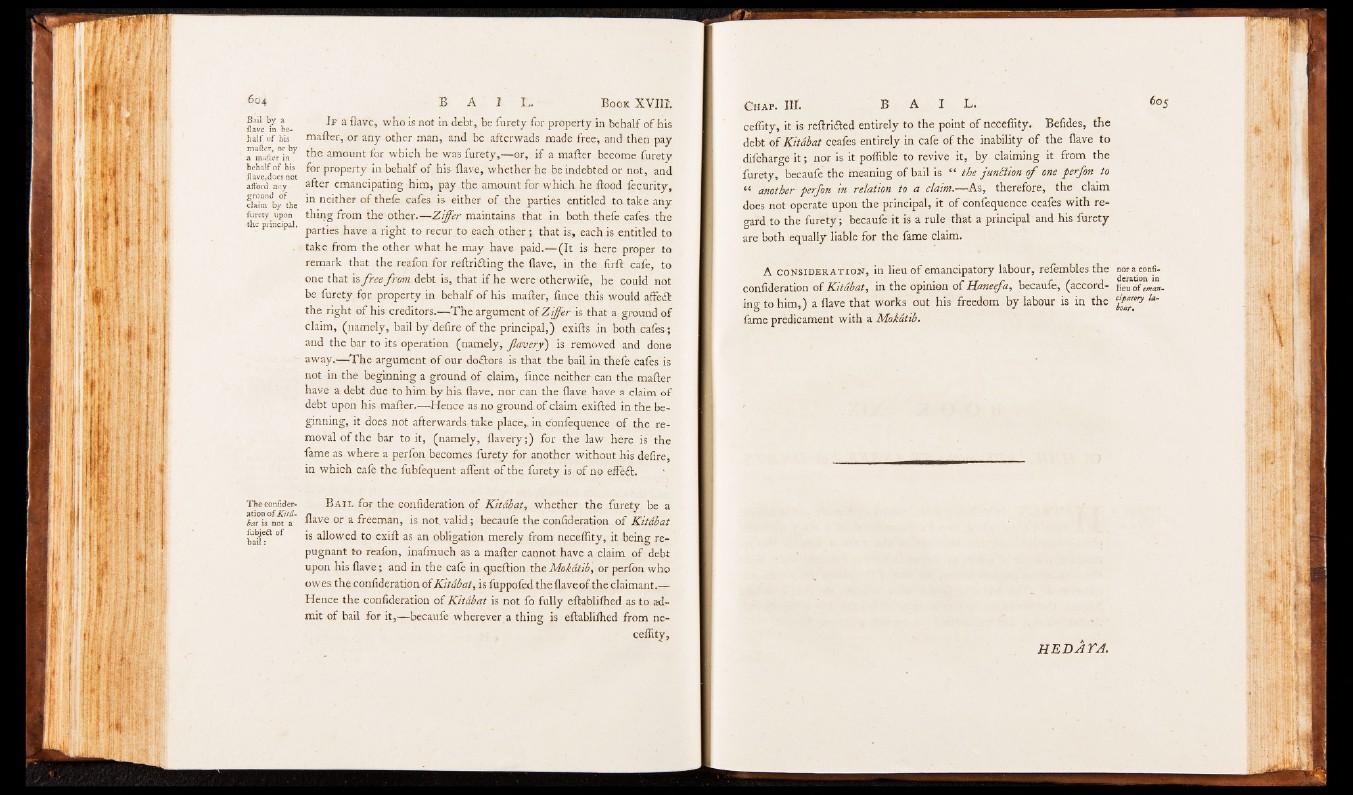
Bail by a
flave in behalf
of his
in after, or by
a matter in
behalf of his
flave,does not
afford ar.y
ground of
claim by the
furety upon
the principal.
The eonfider-
ation of Kitdbat
is. not a
fubjeft of
bail:
If a flave, who is not in debt, be furety for property in behalf of his
mafter, or any other man, and be afterwads made free-, and then pay
the amount for which he was furety,— or, if a mafter become furety
for property in behalf of his flave, whether he be indebted or not, and
after emancipating him, pay the. amount for which he flood fecurity,
in neither of thefe cafes is either of the parties entitled to. take any
thing from the1 other.— Ziffer maintains that in both thefe cafes- the
parties have a right to recur to each other; that is, each is entitled to
take from the other what he may have paid.— (It is here proper to
remark that the reafon for reftricting the flave, in the firft cafe, to
one that is free from, debt is, that if he were otherwife, he could not
be furety for property in behalf of his mafter, fince this would affedt
the right of his. creditors.— The argument of Ziffer is that- a. ground of
claim, (namely, bail by defire of the principal,) exifts in both cafes-;
and the bar to its operation (namely, favery) is removed and done
away.— The argument of our doctors is that the bail in thefe cafes is
not in the beginning a ground of claim, fince neither can the mafter
have a. debt due to him. by his flave, nor can the flave have a claim of
debt upon his mafter.— Hence as no ground of claim exifted in the be-
ginning, it does not afterwards take place,, in confequence of the removal
of the bar to it, (namely, flavery;) for the law here is the
lame as where a perfon becomes furety for another without his defire,
in which cafe the fubfequent aflent of the. furety is of no effedf.
B a i l for the confideration of Kitdhat, whether the furety be a
flave or a freeman, is not. valid; becaufe the confideration of Kitdbat
is allowed to exift as an obligation merely from neceflity, it being repugnant
to reafon, inaftnuch as a mafter cannot have a claim of debt
upon his flave; and in the cafe in queftion the Mokdtib, or perfon who
owes the confideration o f Kitdbat, is fuppofed theflaveof the claimant..—
Hence the confideration of Kitdbat is not fo fully eftablifhed as to admit
of hail for it,— becaufe wherever a thing is eftablilhed from neceflity,
ceflity, it is reftridted entirely to the point of neceflity. Befides, the
debt of Kitdbat ceafes entirely in cafe of the inability of the flave to
difcharge i t ; nor is it poflible to revive it, by claiming it from the
furety, becaufe the meaning of bail is “ the juntiion o f one perfon to
“ another' perfon in relation to a claim.— As, therefore, the claim
does not operate upon the principal, it of confequence ceafes with regard
to the furety; becaufe it is a rule that a principal and his furety
are both equally liable for the fame claim.
A con s id er a t io n , in lieu o f emancipatory labour, refembles the nor a confi-
• i • * r t t r r / j deration in
confideration o f Kitdbat, in the opinion of Haneefa, became, (accord- lieu of man-
ing to him,) a flave that works out his freedom by labour is in the ci f f ‘° f u'
lame predicament with a Mokdtib.
HEDATA.